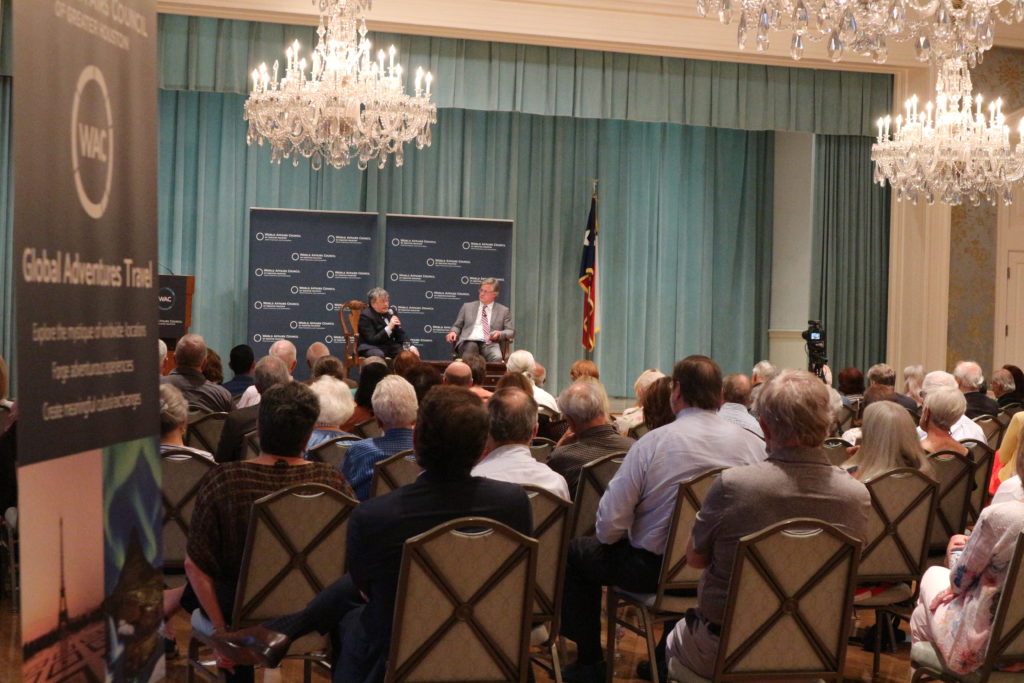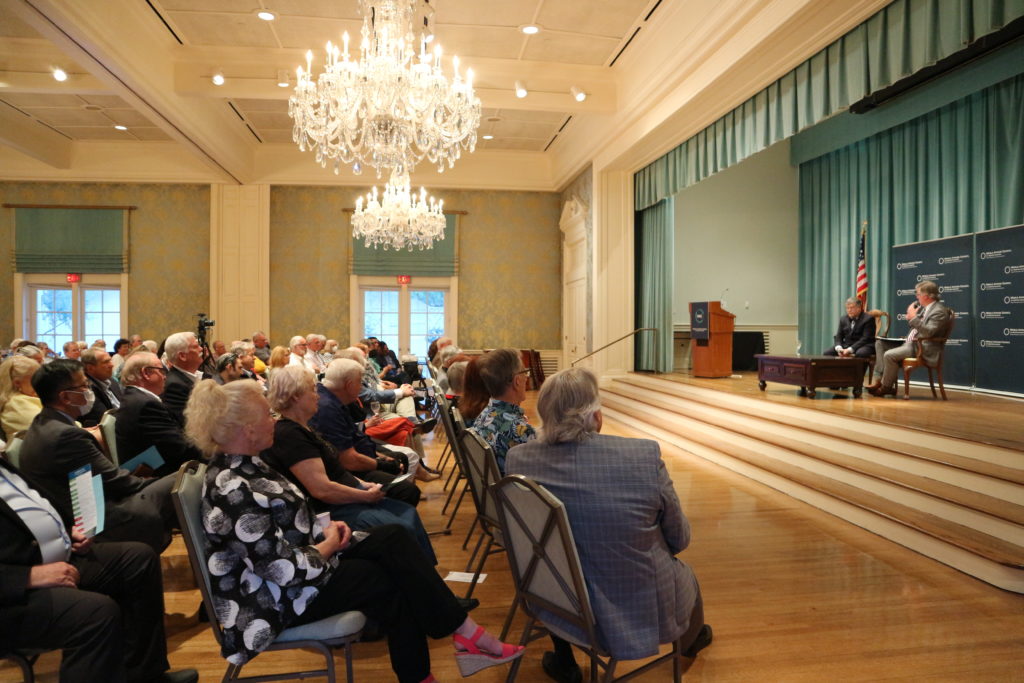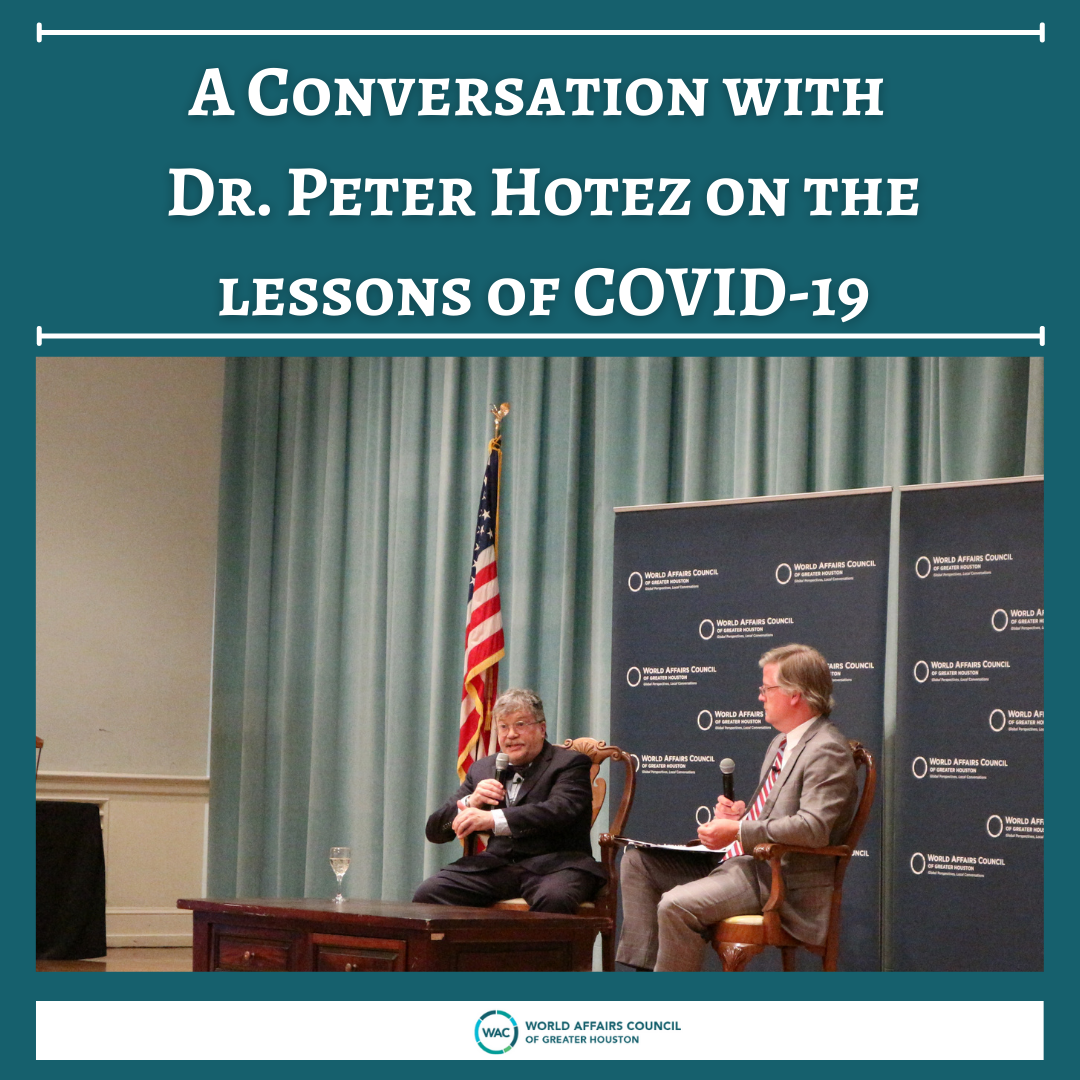by Analys Barinaga
Long before 2020, Dr. Peter Hotez’s lab had been researching coronaviruses and developing vaccines to ward against them. When COVID-19 swept across the world, Dr. Hotez’s work took on a new and urgent importance. He led an initiative, along with Dr. Maria Bottazzi, to develop a low-cost COVID-19 vaccine and news networks regularly hosted him to speak about the status of the pandemic. While Dr. Hotez has long been an expert in coronavirus diseases, the pandemic has brought his work into the limelight as the science which was once confined to labs is brought into our political discourse and everyday lives.
The World Affairs Council of Greater Houston was honored to host Dr. Hotez, the dean of the National School of Tropical Medicine at Baylor College of Medicine and a frequent speaker at the Council, to discuss his thoughts on the origins of COVID-19 and the challenges in adequately responding to the pandemic.
In the discussion, Dr. Hotez walked the audience through the origin and growth of COVID-19. He explained that the leading theory for the start of COVID-19 is that it originated from a wet market in China. These wet markets can include the slaughter and sale of exotic animals, creating a petri dish of diseases that are foreign to humans.
While a wet market is the most plausible starting point for COVID-19, the details of the virus’ origins remain hazy and alternative theories abound. One popular hypothesis is that the virus originated from a lab leak in the Wuhan Institute of Virology. According to Dr. Hotez, there is no concrete evidence behind this theory.
Still, a proper outbreak investigation must be done in Central China, something that China has not been fully on board with. As Dr. Hotez stated, “[we] still need to know the origins of COVID-19, and that’s what we’re failing to do.” 
The murky origins of COVID-19 were a sign of larger confusion to come. Dr. Hotez explained that there were at least two early missteps that led to the initial misunderstandings about COVID-19. First, it was believed that there was no asymptomatic transmission and second, COVID-19 was thought to be purely a respiratory illness. These beliefs, which ultimately proved wrong, caused the scientific community to mistakenly approach COVID-19 like a second SARS, while the virus crept unabated around the world.
Compounding this issue was the fact that, unlike many other coronaviruses, a large amount of people with COVID-19, about 40%, have no symptoms. Thus, the virus could spread much more easily between people, communities, and countries and ultimately make so many people fatally ill.
In addition to the initial confusion regarding the biology of COVID-19 were the challenges in governance. Dr. Hotez characterizes the organization and response of the CDC as an “epic failure”. Instead of proactively taking the lead to protect communities, the CDC was reactive and disorganized. According to Dr. Hotez, governments around the world also downplayed the severity of the pandemic, only adding to the lateness and insufficiency of aid. 
As the pandemic weaved its way into everyday life, scientists had to contend with something Dr. Hotez calls the rise of “anti-science aggression.” Often this manifested itself as the swelling of anti-vaccine sentiment. Like many issues in our increasing polarized political climate, the issue of vaccines rapidly became controversial.
Dr. Hotez recounted how he found himself suddenly at a crossroads on whether to engage in the vaccine debate. He could either speak his mind on the issue or remain apolitical and quiet; he chose the former. This made him a principal expert that news outlets sought out, but also a target for anti-vax protesters, something which affected both his personal and public life. The politicization was frustrating, especially as scientists and academics are trained to resist showing a partisan leaning.
Ultimately, the failures of COVID-19 must be studied so that we can better respond to disease outbreaks in the future. Dr. Hotez’s work studying coronaviruses shows us that COVID-19 will likely be just one of many pandemics that our world will grapple with in the 21st century. If we ignore the lessons of COVID-19, then we do so at our own peril.

